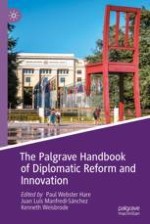2023 | OriginalPaper | Chapter
14. What Motivates South Korea’s Diplomatic Reform and Innovation?
Author : HwaJung Kim
Published in: The Palgrave Handbook of Diplomatic Reform and Innovation
Publisher: Springer International Publishing
Activate our intelligent search to find suitable subject content or patents.
Select sections of text to find matching patents with Artificial Intelligence. powered by
Select sections of text to find additional relevant content using AI-assisted search. powered by
